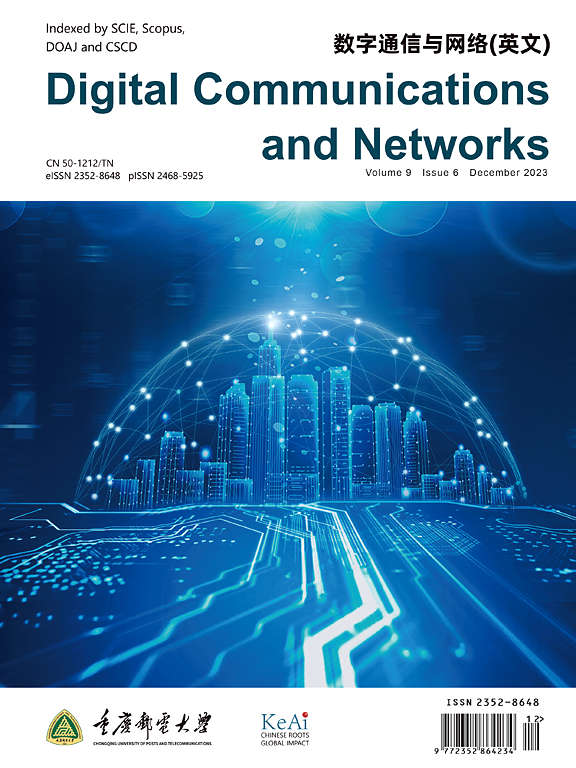Blockchain-based lightweight trusted data interaction scheme for cross-domain IIoT
IF 7.5
2区 计算机科学
Q1 TELECOMMUNICATIONS
引用次数: 0
Abstract
To facilitate cross-domain data interaction in the Industrial Internet of Things (IIoT), establishing trust between multiple administrative domains is essential. Although blockchain technology has been proposed as a solution, current techniques still suffer from issues related to efficiency, security, and privacy. Our research aims to address these challenges by proposing a lightweight, trusted data interaction scheme based on blockchain, which reduces redundant interactions among entities. We enhance the traditional Practical Byzantine Fault Tolerance (PBFT) algorithm to support lightweight distributed consensus in large-scale IIoT scenarios. Introducing a composite digital signature algorithm and incorporating veto power minimizes resource consumption and eliminates ineffective consensus operations. The experimental results show that, compared with PBFT, our scheme reduces latency by 27.2%, thereby improving communication efficiency and resource utilization. Furthermore, we develop a lightweight authentication technique specifically for cross-domain IIoT, leveraging blockchain technology to achieve distributed collaborative authentication. The performance comparisons indicate that our method significantly outperforms traditional schemes, with an average authentication latency of approximately 151 milliseconds. Additionally, we introduce a trusted federated learning (FL) algorithm that ensures comprehensive trust assessments for devices across different domains while protecting data privacy. Extensive simulations and experiments validate the reliability of our approach.
基于区块链的跨域工业物联网轻量级可信数据交互方案
为了促进工业物联网(IIoT)中的跨域数据交互,在多个管理域之间建立信任至关重要。尽管区块链技术已被提出作为一种解决方案,但目前的技术仍然存在与效率、安全性和隐私相关的问题。我们的研究旨在通过提出基于区块链的轻量级可信数据交互方案来解决这些挑战,该方案减少了实体之间的冗余交互。我们改进了传统的实用拜占庭容错(PBFT)算法,以支持大规模工业物联网场景下的轻量级分布式共识。引入复合数字签名算法并结合否决权,最大限度地减少了资源消耗,消除了无效的共识操作。实验结果表明,与PBFT相比,该方案降低了27.2%的时延,从而提高了通信效率和资源利用率。此外,我们开发了一种专门针对跨域IIoT的轻量级身份验证技术,利用区块链技术实现分布式协作身份验证。性能比较表明,我们的方法明显优于传统方案,平均身份验证延迟约为151毫秒。此外,我们引入了一种可信的联邦学习(FL)算法,确保对不同领域的设备进行全面的信任评估,同时保护数据隐私。大量的仿真和实验验证了我们方法的可靠性。
本文章由计算机程序翻译,如有差异,请以英文原文为准。
求助全文
约1分钟内获得全文
求助全文
来源期刊

Digital Communications and Networks
Computer Science-Hardware and Architecture
CiteScore
12.80
自引率
5.10%
发文量
915
审稿时长
30 weeks
期刊介绍:
Digital Communications and Networks is a prestigious journal that emphasizes on communication systems and networks. We publish only top-notch original articles and authoritative reviews, which undergo rigorous peer-review. We are proud to announce that all our articles are fully Open Access and can be accessed on ScienceDirect. Our journal is recognized and indexed by eminent databases such as the Science Citation Index Expanded (SCIE) and Scopus.
In addition to regular articles, we may also consider exceptional conference papers that have been significantly expanded. Furthermore, we periodically release special issues that focus on specific aspects of the field.
In conclusion, Digital Communications and Networks is a leading journal that guarantees exceptional quality and accessibility for researchers and scholars in the field of communication systems and networks.
 求助内容:
求助内容: 应助结果提醒方式:
应助结果提醒方式:


